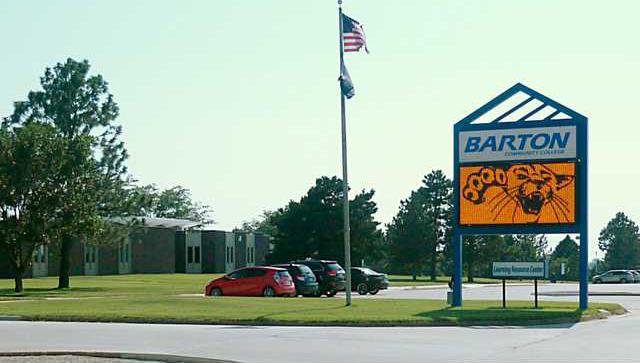Barton Community College has been serving Ellsworth Correctional Facility (ECF) and Larned State Correctional Facility (LSCF) since 2001 with educational programming. This past summer, the college added online courses to its available services.
Barton Community College is the first in the state to offer online learning to incarcerated students, administrators reported Tuesday. Barton and the Kansas Department of Corrections allow students to use laptops and take them back to their cells for continued learning.
Nicole Barr, coordinator of Correctional Education Services, and Chris Baker, executive director of Healthcare and Public Service Education, reported on the program at Tuesday’s BCC Board of Trustees meeting. The correctional education program is called BASICS – Building Academic Skills in Correctional Settings.
Barr noted that after incarceration, there is a high rate of recidivism, meaning they are likely to commit new offenses and return to prison. “We want to break that cycle of recidivism.”
Education provides opportunities for personal growth, improving self-esteem and life skills, according to their report. A key barrier for ex-offenders is employment and education opens doors to better job prospects. A study by the RAND Corporation found that inmates who participate in correctional education programs have a 43% lower chance of recidivism.
“Barton’s doing that,” Barr said.
Ninety-five percent of all prison inmates will eventually be released, she continued.
“Our job is to see that they release better.”
Programs offered
Barton offers everything from GED courses to post-secondary degrees. This summer, it became the pilot program for online education to inmates, offering two courses (anatomy & physiology and computer concepts) with 19 students enrolled. This fall it has grown to five online courses with 43 students enrolled, Baker said. Courses in accounting, principles of macroeconomics, and customer service were added.
The logistics for offering online courses to inmates and maintaining security took several years to implement he added. It was a dream at Barton when he started there in 2017.
Programs offered include an associate degree in general studies (60 hour degree); business management and leadership associate in applied science degree (64 hour degree); business management and leadership certificate (18 credit hours); and certificates in welding, plumbing and carpentry. However, they can only offer the courses if an instructor is available and Vice President of Instruction Elaine Simmons said it isn’t easy to find adjutant (part-time) instructors in carpentry and plumbing. “We’ve been looking for adjuncts for over a year.”
Correctional Education Highlights
Barr said the college gets a lot of input from private industry partners that actively hire graduates from BCC programming, contributing significantly to employment opportunities for the students.
Barton President Dr. Marcus Garstecki noted that some inmates also work with industry partners while they serve their sentences. Fuller Industries has seven inmates transported from Larned and that is helping with Fuller’s workforce shortage.
“Employers find it’s a tremendous benefit,” Simmons agreed. The inmates are paid and a percentage of their wage goes to the state for room and board and restoration. A percentage is also set aside in a savings account.
Students must pay for college courses but are now eligible for PELL grants, financial aid and scholarships. Barton provides essential school supplies such as pencils, pens, notebooks, folders and clear backpacks.
Mike Johnson, chairman of Barton’s Board of Trustees, said people haven’t always been receptive to Barton’s venture into prisons but it is gaining public acceptance. Tuesday’s report states that every $1 invested in correctional education saves taxpayers $5 in terms of recidivism costs.
Barr shared information about two former inmates who used Barton education to turn their lives around. Anthony Smith was released from Ellsworth Correctional Facility in 2022. He completed a welding certificate and now works as a robotics welder in Michigan. Neil Tinio was released from Larned State Correctional Facility in 2022. He completed programs in carpentry and plumbing and now works as a rough plumber in Colorado Springs.
Trustee Gary Burke summed up the presentation by saying, “I don’t know how people can put a price on changing someone’s life. We are making a difference.”
In November, Barton will visit the correctional facilities to host its annual Learning Celebration, recognizing the achievements of students who have successfully completed their GED, Certificate programs and Associate degrees.
Work Preparedness report
In other business Tuesday, the trustees heard a report on Work Preparedness from Dr. Kathy Kottas, dean of Workforce Training and Community Education.
This annual report looks at certification pass rates as well as feedback from former students and their employers.
Overall, employers who answered a survey rated Barton students as “excellent” or “good” in the areas of general education, technical education and professionalism 98.5% of the time (up from 88% the year before). Graduates were rated at 100% for their technical education preparedness and professionalism.
When asked “How satisfied are you with the vocational training you received at Barton?” 85% of the graduates who responded said “excellent” or “very good.”
For health-care certification pass rates, Kottas reported the ADN/RN, LPN and MA (Medical Assistant) programs had a 100% pass rate. Eight health-care programs had a pass rate greater than 80% and nine of the 11 programs had pass rates above the state and national industry average. The 2023-2024 overall pass for health-care programs was 86.8%.
Certification pass rates for trades and technology programs (such as welding or Commercial Driver’s License) saw eight programs with 100% pass rates and 12 of 13 certifications were over 95%. The 2022-2023 overall pass rate for all Trades & Technology certifications was 97.2%.
Community report
Maggie Harris, chief communication officer at Barton, shared the 2024 Community Report a 24-page document that highlights Barton’s mission. (See story here.)
Personnel
The board also approved the following new personnel, all on the Great Bend campus:
• Mark Colglazier – Instructor (Nursing) & Simulation Coordinator (contract)
• Jonell Niles – Foundation Business and Office Manager
• Murilo De Oliveira – Assistant Soccer Coach
• Aaron Thomas – Campus Safety Officer
• Brooke Murphy – Administrative Assistant (Academics)





